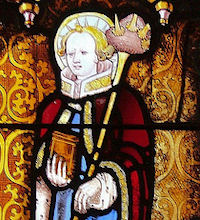
Feastday: September 15
Martyr. A Roman priest who was beaten to death with whips after refusing to sacrifice to the gods, and he was buried in the catacomb on the Via Nomentana. One tradition states that he buried the remains of St. Felicula and was arrested: Since 1969, his cult has been confined to local calendars.
| This article includes a list of references, related reading or external links, but its sources remain unclear because it lacks inline citations. (August 2019) |
Saint Nicomedes was a Martyr of unknown era, whose feast is observed 15 September. He was buried in a catacomb on the Via Nomentana near the gate of that name.
The Roman Martyrologium and the historical Martyrologies of Bede and his imitators place the feast on this date. The Gregorian Sacramentary contains under the same date the orations for his Mass. The name does not appear in the three oldest and most important Manuscripts of the Martyrologium Hieronymianum, but was inserted in later recensions ("Martyrol. Hieronymianum", ed. G. B. de Rossi-L. Duchesne, in Acta SS., November II, 121). The saint is without doubt a martyr of the Roman Church.
He was buried in a catacomb on the Via Nomentana near the gate of that name. Three seventh century Itineraries make explicit reference to his grave, and Pope Adrian I restored the church built over it (De Rossi, Roma Sotterranea, I, 178–79). A titular church of Rome, mentioned in the fifth century, was dedicated to him (titulus S. Nicomedis). The feast of the dedication of his church on 1 June alongside the 15 September feast of his martyrdom were included in the Sarum Rite calendars, but only the 1 June feast day was carried over into the Anglican Book of Common Prayer as a 'lesser holy day' or 'black-letter day'.[1]
Nothing is known of the circumstances of his death. The legend of the martyrdom of Saints Nereus and Achilleus introduces him as a presbyter and places his death at the end of the first century. Other recensions of the martyrdom of St. Nicomedes ascribe the sentence of death to the Emperor Maximianus (beginning of the fourth century).





